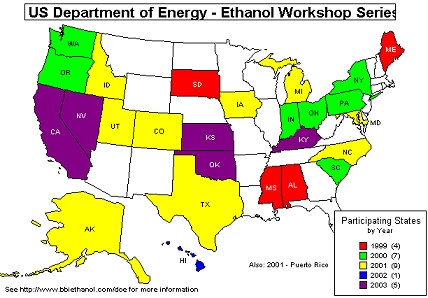 |
|
 |
The U.S. Department of Energy (DOE) and state officials are conducting a series of one-day, state-level workshops to educate key public officials and the general public about ethanol as a transportation fuel.

Where states have held workshops multiple years, only the most recent year is indicated on map
2002/2003 Workshop Calendar
(please click the links below for information)
November 14, 2002 - Ethanol Workshop, Honolulu, Hawaii
January 9, 2003 - Ethanol Workshop, Reno, Nevada
January 23, 2003 - Ethanol Workshop, Topeka, Kansas
January 28, 2003 - Ethanol Workshop, Oklahoma City, Oklahoma
February 3, 2003 - Ethanol Workshop, Frankfort, Kentucky
April 14-15, 2003 - Ethanol Workshop, Sacramento, California
The participating EWS states thus far are:
2002-2003
California, Hawaii, Kansas, Kentucky, Nevada, and Oklahoma.
2001
Alaska, Idaho, Iowa, Maryland, Michigan, North Carolina, Utah, Puerto Rico, Colorado, and Texas.
2000
Colorado, Indiana, New York, Ohio, Oregon/Washington, Pennsylvania, South Carolina, Texas.
1999
Alabama, Alaska, Maine, Michigan, Mississippi, South Dakota, Wisconsin.
EWS News
(Ethanol Workshop Series Newsletter)
To keep everyone posted on state workshops and follow-on activities an Ethanol Workshop Series Newsletter, the EWS News, is published four times a year. Each issue covers the states that have activity to report. The most recent EWS Newsletter is July 2003 (free Adobe Acrobat Reader required for newsletter).
If you would like to be notified about the US DOE Ethanol Workshop Series Workshops, please provide your contact information to Anne Wester:
Anne Wester
Conference Planning Assistant
BBI International
PO Box 1146
Salida, Colorado 81201
Phone: 719-539-0300
Fax: 719-539-0301
awester@bbibiofuels.com
Note: All states that have participated in the US DOE Ethanol Workshop Series are listed on the column on the left of this page. State information is updated as often as received.
BACKGROUND ON THE DOE ETHANOL WORKSHOP SERIES
The production and use of biofuels for transportation can provide several advantages and benefits to our society. Biofuels are domestically produced, thus providing energy security and reducing trade deficits and their associated economic drain. Engines utilizing biofuels produce fewer emissions (approximately 1/3 of all US greenhouse gas emissions come from the combustion of fossil-based transportation fuels). And from an economic standpoint, the local production and use of biofuels creates jobs, generates tax revenues, creates cash flow back into rural communities, and reduces the need for various government assistance programs.
Although the focus of the workshop is cellulose-ethanol, a partnership with the grain-ethanol industry is encouraged. The concept is to build within the state a broad-based mutual foundation of knowledge that prepares for the day when cellulose-ethanol is ready for commercialization. The development of markets for ethanol is also a major part of the overall program.
WORKSHOP GOALS
The ultimate goal of the workshops and associated follow-up activities is to pave the way at a state level for producing ethanol from cellulosic feedstocks. This process starts with educating key government officials and the general public about ethanol fuels in general and their benefits. The next step is to create market demand for ethanol fuels, followed by in-state production of ethanol, followed by production of ethanol from cellulose.
Inside the Midwest, ethanol from cellulose will be facilitated by the use of crop residues starting with corn stover. Outside the Mid-West, the absence of grain feedstocks will facilitate the move to ethanol production from cellulose.
The first goal of the Workshop Series is to educate potential users, government officials, and stakeholders about ethanol fuels and their benefits to:
* create awareness of ethanol,
* create a positive image of ethanol,
* facilitate the widespread use of ethanol,
* facilitate the establishment of ethanol production plants,
* and ultimately to increase the use of ethanol fuels
The second goal is to lay out the pathway for development of an ethanol industry in the state or increase production where it already exists.
|
 |
|
Renewable Diesel Workshops:
NREL
Goals: ..."to educate key public officials and the general public
about biodiesel as a transportation fuel" and ..."to build state and
local coalitions that would form the nuclei of a support group that
would promote and eventually lead to local biodiesel production and
use."
Ethanol Producers'
Technical Workshops:
Perspectives from ethanol producers, production technology
providers, and government researchers. Those in attendance were
given the task of exploring the challenges and opportunities
presented by combining cellulosic ethanol streams with existing
grain streams.
US DOE Ethanol Workshop Series:
A series of one-day, state-level workshops to educate key public
officials and the general public about ethanol as a transportation
fuel.
For best results when printing pages
from this website, try setting your browser or printer driver to print
in landscape orientation instead of portrait to avoid
cutting off text.


|
|
 |